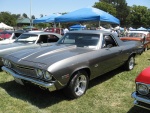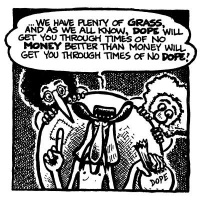Chapter 2
- Please keep these annotations SPOILER-FREE by not revealing information from later pages in the novel.
Page numbers refer to editions with 369 pages, where the story begins on page 1. Not sure if there are other editions with variant pagination. Please let us know otherwise.
Contents
Page 19
OPPOS
Real estate acronym meaning "Over-Priced Piece Of Shit"
Page 20
desert beneath the pavement
An echo of the epigraph, though in this case the sand beneath the pavement is a desert, rather than a beach.
Kaufman and Broad
In 1957 Donald Kaufman and Eli Broad cofounded Kaufman and Broad Building Company in Detroit, Michigan. In 1963 Kaufman and Broad builds its first homes in California and announces it will establish corporate headquarters in Los Angeles. In 2000 the company changed its name to KB Home. KB Home is the largest home builder in the United States, in terms of units built. Between the 1950s and 1970s, Eli Broad was known as "King of Sprawl." Kaufman and Broad built more suburban homes in this country than anyone before or since.
KB Home
Dominguez Flood Control Channel
"The Dominguez Channel extends from the Los Angeles International Airport to the Los Angeles Harbor and drains large if not all portions of the cities of Inglewood, Hawthorne, El Segundo, Gardena, Lawndale, Redondo Beach, Torrance, Carson and Los Angeles." The River Project
Page 21
bigger inside than out
This trope of spaces with interiors larger than they appear from the outside is also present in Pynchon's 1997 novel Mason & Dixon:
- Our Coach is a late invention of the Jesuits [...] wherein the inside is quite notably larger than the outside, though the fact cannot be appreciated until one is inside. (p. 354)
For numerous examples of this trope in various media, see this link. [1]
Page 22
caused Doc about then to swoon abruptly and lose an unknown amount of his day.
It's still Wednesday, March 25, 1970, the second day of the narrative.
"Congratulations, hippie scum [...] and welcome to a world of inconvenience."
Detective Lieutenant Bigfoot Bjornsen echos Walter Sobchak from the 1998 Coen brothers film The Big Lebowski: "Smokey, my friend, you are entering a world of pain."
30-weight voice
30-weight is shorthand for automobile engine oil.
chocolate-covered frozen banana
Very appropriate for Bigfoot, whose namesake is an ape-like creature, to have as his "trademark snack" a banana. And it is quite a delicious snack, actually: recipe.
to gaze tubeward
Which is exactly what the denizens of Channel View Estates would be doing, viewing channels.
Page 23
Doc made out in the afternoon light
Afternoon, Wednesday, March 25, 1970, the second day of the narrative.
Sawhorse Barricade
A barricade featuring a bar supported on A frames at the opposite ends of the bar, often used by law enforcement for crowd control.
Backhoe
A contraption for digging often attached to the rear of a bulldozer which is considerably smaller albeit more maneuverable than the loader.
Page 24
Forgetful dope fiends should be more cautious about whom they wish to act out their wacko fantasies upon.
Foreshadows Charles Manson who first appears on page 29.
1968 El Camino
The Chevrolet El Camino is a coupe utility vehicle produced by the Chevrolet division of General Motors from 1959 through 1960, with production resuming in 1964 and continuing through 1987. Wikipedia
Page 26
Fatso Judson
Fatso Judson is the sadistic stockade sergeant played by Ernest Borgnine in "From Here To Eternity," a 1953 drama film based on the novel of the same name by James Jones.
It wasn't until the middle of rush hour
Late afternoon, Wednesday, March 25, 1970, the second day of the narrative.
...a maritime lawfirm...called Hardy, Gridley, and Chatfield...
The firm's partners share the surnames of three recipients of famous naval quotations.
Captain Thomas Hardy commanded Admiral Horatio Nelson's flagship HMS Victory in the Battle of Trafalgar, 21 October 1805. As Nelson lay dying from a French musketball, he said, "Kiss me, Hardy"--almost (but not quite) his last words.[2]
Captain Charles Vernon Gridley commanded Admiral George Dewey's flagship USS Olympia in the Battle of Manila Bay during the Spanish-American War, 1 May 1898. As Dewey's Pacific squadron prepared to "cross the T" of the Spanish fleet, Dewey said, "You may fire when you are ready, Gridley." [3]
Captain Ernle Chatfield commanded Admiral David Beatty's flagship HMS Lion in the Battle of Jutland, 31 May 1916. As Beatty's battlecruiser squadron took heavy damage from their German foes, he said, "Chatfield, there seems to be something wrong with our bloody ships today." [4]
See also M&D, p. 41.
Page 28
Donald and Goofy [...] in fact he's always had to go in every day and shave his beak.
The cartoon being discussed here is "No Sail" from 1945. Available on Youtube and the Chronological Donald Volume II DVD Amazon.
Page 29
Mansonoid conspiracy
On August 9, 1969, members of Charles Manson's "family" murdered the eight-and-a-half-months-pregnant actress Sharon Tate (wife of director Roman Polanski) and four others; the next night, they murdered Leno and Rosemary LaBianca. Manson orchestrated these murders for the sake of Helter Skelter, an apocalyptic war he believed would arise from tension over racial relations between blacks and whites.
After no more than an hour of this
Early evening Wednesday, March 25, 1970, the second day of the narrative.
some longhair sympathizer of a DDA
Presumably referring to Penny (first mentioned on page 4).
Page 30
the local news came on
Early evening Wednesday, March 25, 1970, the second day of the narrative.
the Santa Anas
The Santa Ana winds are strong, hot, dry winds commonly experienced in southern California.
Page 31
intended to give the victim mouth-to-mouth
This car-to-human interaction is similar to a scene in Vineland in which Rex has sex with his Porsche, which also recalls Rachel Owlglass's intimate relationship with her MG in Chapter 1 of V..
Not the one with the r in it
Benzidine is a chemical used to detect blood. Benzedrine is an amphetamine.
Page 32
Mod Squad
TV show running from 1968-1973 which featured hipster kids in trouble with the law working undercover for the police.
Page 33
huaraches
Huaraches are Mexican sandals often associated with California surf culture. See, for example, the Beach Boys' "Surfin' Safari" (1963): "You'd see 'em wearing their baggies / Huarache sandals too ...."
the satanic Detective . . . everything in it that money could buy
This is a biblical allusion to Matthew, chapter 4, in which Jesus is led to the desert and tempted by the devil: "Again, the devil took him to a very high mountain and showed him all the kingdoms of the world and their splendor. 'All this I will give you,' he said, 'if you will bow down and worship me.'"
Also, similar to how Hector must have worked on Zoyd in Vineland: "Hector had been trying over and over for years to develop him as a resource, and so far — technically — Zoyd had hung on to his virginity... But... He kept coming back, each time with a new and more demented plan..." (p. 12 Vineland)
Freak Brothers' dictumGilbert Shelton's series of "Underground Comix"—"The Fabulous Furry Freak Brothers"—was one of the most popular "Comix" of its time among fans of the form. Featuring the stoned adventures of Freewheelin' Franklin, Phineas T. Freakears, Fat Freddy Freekowtski and the ever popular Fat Freddy's Cat. Famous for [among other things] Freewheelin' Franklin's dictum: "Dope will get you through times of no money better than money will get you through times of no dope." Wikipedia entry
Glass House
Familiar name of downtown LA's Metropolitan Jail.
bricks and bricks of shit stacked to the roof
In Vineland, the police try to frame Zoyd by putting an enormous stash of pot in his house: "the biggest block of pressed marijuana Zoyd had ever seen in his life, too big to have fit through any door yet towering there, mysteriously, a shaggy monolithic slab reaching almost to the ceiling" (pg. 294).
Page 34
At the office next day
Thursday, March 26, 1970, the third day of the narrative.
..."the diffident ring of the Princess phone..."
See page 154.
Sidney Omarr
Sydney Omarr (an apparent spelling mistake on Pynchon's part) was a popular astrologer whose horoscopes were syndicated in many papers, including the LA Times.
Ah, fuck no. Not this.
This shows how wrought up Doc is, since Shasta already told him she wasn't living there anymore (page four: "I moved out of the old place, staying where I can anymore, don't ask.").
Page 35
"You're apologizing, Bigfoot?" "Ever known me to?"
Bigfoot, movie enthusiast and collector of Wild West paraphernalia, would almost certainly be familiar with She Wore a Yellow Ribbon (1949), where John Wayne's character says (repeatedly), "Never apologize, it's a sign of weakness."
Page 36
hizaz kar
Variant spelling of hijaz kar. Dick Dale's famous Misirlou is in fact a Greek tune based on the scale of Makam Hijaz Kar (E-F-G#-A-B-C-D#), and is playable on a single string of a guitar. Misirlou is one of the most famous of "Surf" tunes, thanks in large part to its presence on the Beach Boys album Surfin' USA and its inclusion in the soundtrack of the film Pulp Fiction. Wikipedia; Great 1963 clip of Dick Dale & the Deltones performing "Misirlou" from the 1963 movie A Swingin' Affair (Is that a young Al Franken on bass?)
In the kitchen hung a creeping fig
This highly invasive plant is also mentioned on the first page of Vineland, suggesting creeps and invasions and the like which occur in both novels.
Page 37
...will make Jimi Hendrix want to listen to surf music again.
In Hendrix's song Third Stone From the Sun, on the Are You Experienced album, near the end of the song Hendrix says To you I shall put an end, then you'll never hear surf music again.
the Makaha of Sound
A kind of surfer metaphor. Makaha, Hawaii is legendary for its huge waves.
kazoo
I may be wrong, but I'm pretty sure that every Pynchon novel has a kazoo.
Who can forget Boyd Beaver's All Kazoo Orchestra?
Chantays, the Trashmen, the Halibuts
Three surf bands, two famous, one an anachronism time traveling backwards from the 80's. The Chantays — famous for "Pipeline" — is presented here on the Lawrence Welk show, May 18, 1963. The immortal Trashmen gave us "Surfin' Bird" and the Halibuts were a 1980s surf-revival group.
Coy and I should've met cute
A "meet cute"is a movie term that describes a contrived, humorous meeting between two possible romantic partners (e.g., a boy and girl bump into each other on the street then fall in love). In the 1934 film The Gay Divorce, with Fred Astaire and Ginger Rogers, in the song "Looking for a Needle in a Haystack", Astaire sings about finding the woman of his dreams whose name he never learned after they had had a "cute meet."
Roger Mexico and Jessica Swanlake are described as having had "what Hollywood likes to call a 'cute meet'" in Pynchon's 1973 novel Gravity's Rainbow, on page 38.
Page 38
Charles Manson
The Manson family murders play an important thematic role in this novel. Is it possible that Pynchon timed the release of this novel to coincide with the 40th anniversary of the tragedy (August 1969)?
Page 39
El Drano
Besides the associations mentioned here, Drano was rumored to be used to "step on" heroin (completely substitute for or augment the quantity of). Also, "Christmas tree meth" is slang for Green Methamphetamine produced using Drano crystals, although this might be anachronistic.
Page 41
Pat Dubonnet
Spoken phonetically, with the French pronunciation of Du Bonnet, this cop's name is "Pat da bunny" har har har...
Dubonnet is an aperitif containing quinine, first sold in 1846 as a means of inducing French soldiers in North Africa to take quinine to combat malaria. [5]
Page 42
Here I am . . . to save the day!
Amethyst is singing (albeit incorrectly) the theme song of the Mighty Mouse cartoon.
This passage is as significant for what is not on the television as it is for what is on. If Mighty Mouse is on, it's between 4:00 and 4:30 P.M., meaning that Dark Shadows, which shares the time slot on another channel, is not on. Which is not the case at a certain zombie-infested mansion.
Page 43
Later in the afternoon
Afternoon, Thursday, March 26, 1970, the third day of the narrative.
Scott Oof
Doc's cousin and lead guitar in the surf band the Corvairs, Oof also is a character in Pynchon's 1990 novel Vineland, playing essentially the same character:
- After a bit, Corvairs lead guitar and vocalist Scott Oof wandered in from the kitchen to join them, leaning on the doorjamb playing with his hair. (p.23)
Scott had been playing with a local group known as the Corvairs, till half of them had decided to join the northward migration of those years to Humboldt, Vineland, and Del Norte.
Pynchon migrated north along with many of the young people he knew from the South Bay to Humboldt county. /CW/
This passage reinforces the connection between Inherent Vice and Vineland. So Oof had remained in Southern California, while half the band migrated north to Vineland.
Oof's name also opens a rabbithole to the comic genius of P.G. Wodehouse. "Oofy" Prosser is a frequent co-conspirator in the Wooster-Jeeves comedies. "Oof" is also 20th C. British slang for moolah, pelf, wealth, geedis.
Note that many different surf music groups in many different times and places adopted "The Corvairs" as a nom-de-band.
The Big Valley
The Big Valley is an American television Western which ran on ABC from September 15, 1965 to May 19, 1969, starring Barbara Stanwyck, as a California widowed mother. Wikipedia As a major-league movie star during the golden age of Noir, Barbara Stanwyck co-starred with Fred MacMurray and Edward G. Robinson in Billy Wilder's classic Double Indemnity, scripted by Raymond Chandler.
This song from Scott Oof's band Beer points towards the San Joaquin Valley, which in 1970 was about the un-hippest place in the known universe.
| Chapter 1 pp. 1-18 |
Chapter 2 pp. 19-45 |
Chapter 3 pp. 46-49 |
Chapter 4 pp. 50-54 |
Chapter 5 pp. 55-67 |
| Chapter 6 pp. 68-88 |
Chapter 7 pp. 89-110 |
Chapter 8 pp. 111-123 |
Chapter 9 pp. 124-153 |
Chapter 10 pp. 154-162 |
| Chapter 11 pp. 163-185 |
Chapter 12 pp. 186-206 |
Chapter 13 pp. 207-234 |
Chapter 14 pp. 235-255 |
Chapter 15 pp. 256-274 |
| Chapter 16 pp. 275-295 |
Chapter 17 pp. 296-314 |
Chapter 18 pp. 315-342 |
Chapter 19 pp. 343-350 |
Chapter 20 pp. 351-363 |
| Chapter 21 pp. 364-369 |


